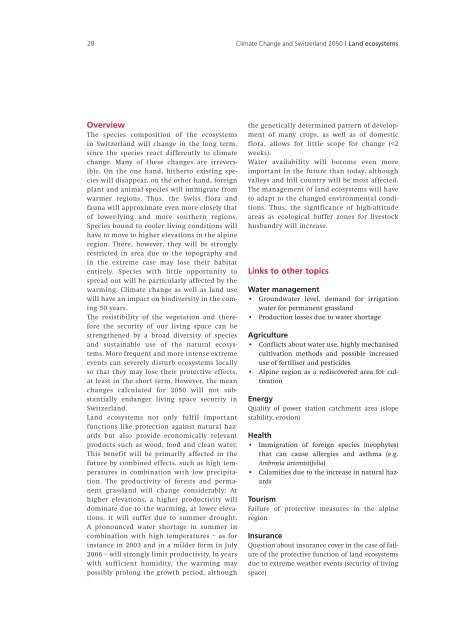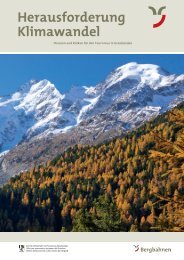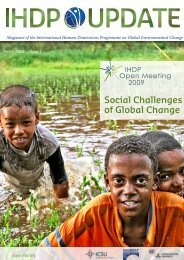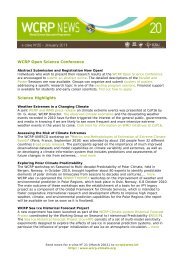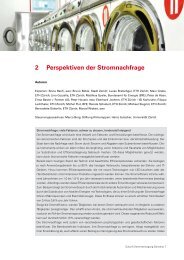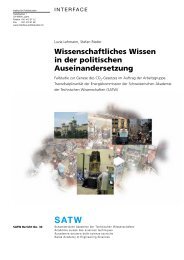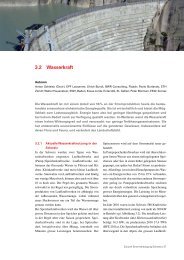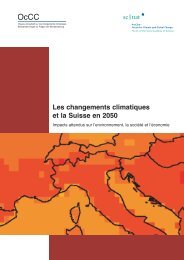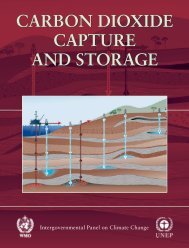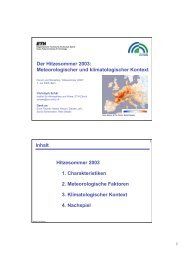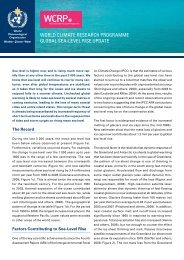Climate Change and Switzerland 2050 - OcCC - SCNAT
Climate Change and Switzerland 2050 - OcCC - SCNAT
Climate Change and Switzerland 2050 - OcCC - SCNAT
You also want an ePaper? Increase the reach of your titles
YUMPU automatically turns print PDFs into web optimized ePapers that Google loves.
28 <strong>Climate</strong> <strong>Change</strong> <strong>and</strong> Switzerl<strong>and</strong> <strong>2050</strong> | L<strong>and</strong> ecosystems<br />
Overview<br />
The species composition of the ecosystems<br />
in Switzerl<strong>and</strong> will change in the long term,<br />
since the species react differently to climate<br />
change. Many of these changes are irreversible.<br />
On the one h<strong>and</strong>, hitherto existing species<br />
will disappear, on the other h<strong>and</strong>, foreign<br />
plant <strong>and</strong> animal species will immigrate from<br />
warmer regions. Thus, the Swiss flora <strong>and</strong><br />
fauna will approximate even more closely that<br />
of lower-lying <strong>and</strong> more southern regions.<br />
Species bound to cooler living conditions will<br />
have to move to higher elevations in the alpine<br />
region. There, however, they will be strongly<br />
restricted in area due to the topography <strong>and</strong><br />
in the extreme case may lose their habitat<br />
entirely. Species with little opportunity to<br />
spread out will be particularly affected by the<br />
warming. <strong>Climate</strong> change as well as l<strong>and</strong> use<br />
will have an impact on biodiversity in the coming<br />
50 years.<br />
The resistibility of the vegetation <strong>and</strong> therefore<br />
the security of our living space can be<br />
strengthened by a broad diversity of species<br />
<strong>and</strong> sustainable use of the natural ecosystems.<br />
More frequent <strong>and</strong> more intense extreme<br />
events can severely disturb ecosystems locally<br />
so that they may lose their protective effects,<br />
at least in the short term. However, the mean<br />
changes calculated for <strong>2050</strong> will not substantially<br />
endanger living space security in<br />
Switzerl<strong>and</strong>.<br />
L<strong>and</strong> ecosystems not only fulfil important<br />
functions like protection against natural hazards<br />
but also provide economically relevant<br />
products such as wood, food <strong>and</strong> clean water.<br />
This benefit will be primarily affected in the<br />
future by combined effects, such as high temperatures<br />
in combination with low precipitation.<br />
The productivity of forests <strong>and</strong> permanent<br />
grassl<strong>and</strong> will change considerably: At<br />
higher elevations, a higher productivity will<br />
dominate due to the warming, at lower elevations,<br />
it will suffer due to summer drought.<br />
A pronounced water shortage in summer in<br />
combination with high temperatures – as for<br />
instance in 2003 <strong>and</strong> in a milder form in July<br />
2006 – will strongly limit productivity. In years<br />
with sufficient humidity, the warming may<br />
possibly prolong the growth period, although<br />
the genetically determined pattern of development<br />
of many crops, as well as of domestic<br />
flora, allows for little scope for change (


